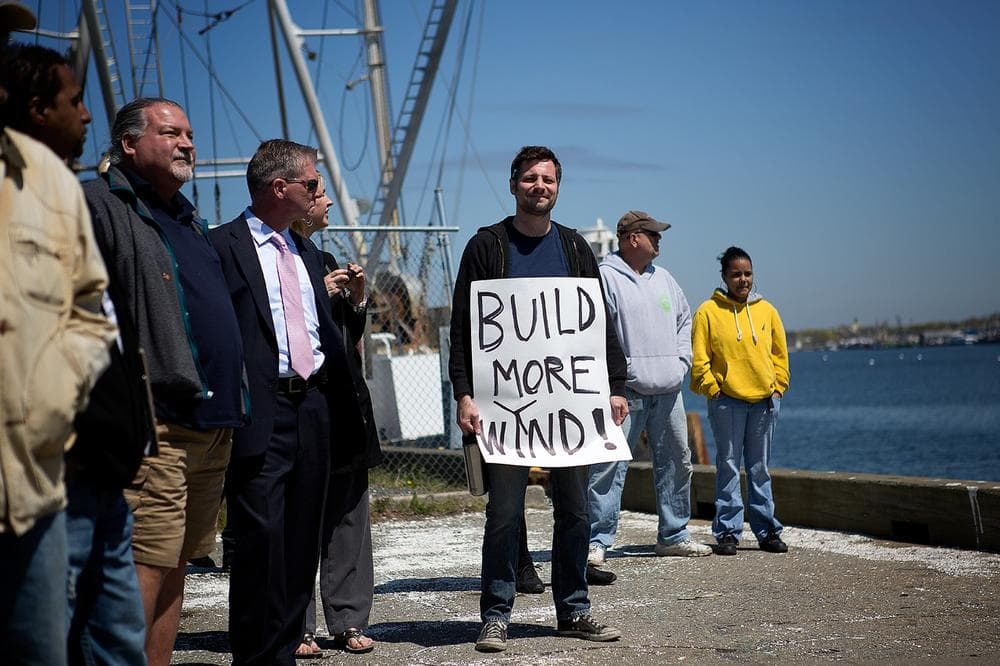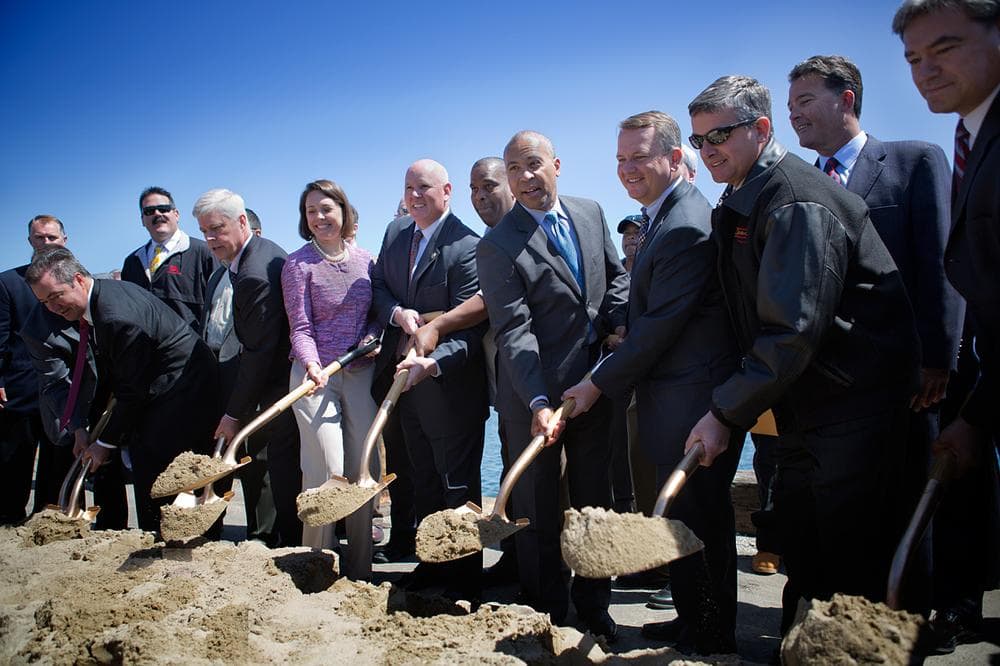Advertisement
As An Offshore Wind Hub, Can New Bedford Light The World Again?

New Bedford was once known as the city that lit the world. Its whale oil could be found in candles and lamps across the country.
Those glory days are long gone. Now, the troubled city is trying to rekindle its old fame with an alternative form of energy: offshore wind.
This month, the state began construction on a $100 million purpose-built port to transport offshore wind equipment to sea. New Bedford is praying this will be its saving grace — bringing jobs and money into a long-struggling community.
For generations, water was New Bedford's lifeblood, the source of its wealth. The water is still here, but the wealth is gone.

These days, you notice just a glimmer of New Bedford's old opulence shining through the decay — the whaling captain's mansions, the cobblestone streets, the oldest continuously-operating elevator in the country. Take that elevator up to the third floor and you’ll find Mayor Jon Mitchell.
“On the eve of the civil war, New Bedford was the wealthiest city per capita in the United States,” he said. “New Bedford was to whaling what Detroit was to automobiles.”
Mitchell is trying to recreate those riches.
New Energy Jobs
On a chilly May morning, Mitchell joined state officials and local union representatives to break ground on the New Bedford Marine Commerce Terminal.
The port is being described as the first of its kind in the country — big enough to transport wind blades the length of a football field. The hope is that it will serve as the hub for the offshore wind industry. And with it bring something this city desperately needs — jobs.
The unemployment rate in New Bedford is persistently high. Right now, it's more than 11 percent. But Mitchell sees the winds shifting.

“The south terminal project holds the potential for a generation of jobs, like nothing that has materialized in the last half century,” he said. “We're a corner of the state that's had its hopes dashed so many times in the past, wanting transformative economic development, and not quite getting there. Now, it's real.”
A quarter of the nation's wind reserves lies just south of Martha's Vineyard, and New Bedford is the closest deepwater port. Mitchell says his city is sitting on the Saudi Arabia of wind.
The mayor's optimism is rubbing off on Justin Sylvia, who is trying to land a job on the port project as a heavy equipment operator.
“I mean it's a $100 million project that's supposed to last for 19 months on an accelerated schedule,” he said. “For two years that looks like a steady income and a lot of overtime that allows you to put food on your family's table.”
These days, Sylvia wakes up at 3:30 a.m. to commute from New Bedford to Cambridge. He said he would love to work closer to home so he could spend time with his three kids. Sylvia has plenty of friends in the same boat, some who are already going through hazardous waste training so they can find jobs dredging the port.
Advertisement
“There's definitely a big buzz,” he said. “The main focus is get as many New Bedford unemployed workers that are capable and trained properly.”
New Bedford is already working with Bristol Community College to secure grants that will train displaced workers.
In April, the mayor took a trade delegation to Bremerhaven, Germany. The city looks like New Bedford's European twin. Back in 2005, the German city suffered from an unemployment rate of 24 percent. Now, it's down to 14 percent — mostly because of the offshore wind industry.
The Skeptic
But Matt Kaplan, a wind analyst for IHS Emerging Energy Research in Cambridge, is skeptical New Bedford can duplicate Bremerhaven's success.
“For offshore wind, in general in the United States, it will have to be tied to creating jobs and to spurring economic development in order to really be successful here because of the premium cost,” he said.
Kaplan said the problem is that no matter how strong the wind gusts blow, local utility companies have to be willing to pay a premium for pricey offshore wind energy. For now, there are federal subsidies that help nudge development along, but there's no guarantee that the government's helping hand will always be there. And, if it's not the jobs will disappear.
Still, Kaplan said it helps that New Bedford is first in designing an offshore wind-friendly port.
“But whether that's going to make New Bedford the one-stop shop moving forward forever, for being the only port for offshore wind, I think it's a really tough call just because of the need to really create local jobs in each state that has one of these projects,” Kaplan said.
That raises the inevitable question: How many wind farms will the New Bedford harbor really help build if folks in neighboring states, such as Maine or Rhode Island, want to offset the high price of offshore wind by using their own ports and people?
The Realist
“I think a lot of folks in the community almost get a little nervous when they hear about something that is promised to be the saving grace for New Bedford,” said New Bedford resident Colleen Dawicki, who also leads the UMass Dartmouth Urban Initiative.
During a drive around town, Dawicki, who's on a planning board for the city, pointed out hints that New Bedford is on the cusp of a revival — new coffee shops, new restaurants, new art galleries.
“This here is the city's first hotel downtown in probably 50 years,” she said gesturing to a Marriott Fairfield Inn and Suites.
Dawicki said art, fishing and light manufacturing are keeping the city afloat. These days New Bedford is far better off than it was five years ago. Offshore wind could be the final ingredient in the city's recipe for success.
But, she added, “For so much of its past, New Bedford would hitch its wagon to one star, whether it was the whaling industry or the textile industry or the fishing industry, and I think that having this as one piece of New Bedford's — what is hopefully — success story is important, but it's also important to keep remembering that right now people are trying to make do.”
New Bedford suffers from a high crime rate, limited public transportation and poor public schools.
Dawicki agreed her city could benefit from offshore wind, but it also needs the basics. She said that the city has learned one thing from its own history: A single solution for salvation is not usually the answer.
This program aired on May 20, 2013.
